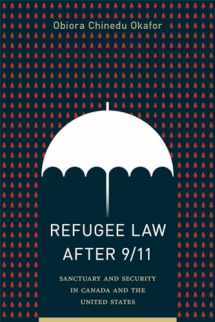
Refugee Law after 9/11: Sanctuary and Security in Canada and the United States (Law and Society)
Book details
Summary
Description
It’s generally assumed that the 9/11 terrorist attacks changed everything about the character of refugee law in the United States, as well as in neighboring Canada. But did they? If so, how do the responses of the two countries compare in terms of their negative impacts on refugee rights? Refugee Law after 9/11 undertakes a systematic examination of available legal, policy, and empirical evidence to reveal a great irony: refugee rights were already so whittled down in both countries before 9/11 that there was relatively little room for negative change after the attacks. Obiora Chinedu Okafor also shows that the US and Canadian governments reacted to 9/11 through changes to their laws concerning refugees in much the same way—and argues that these similar reactions raise significant questions about security relativism and the cogency of US and Canadian national self-images.


We would LOVE it if you could help us and other readers by reviewing the book
Book review



